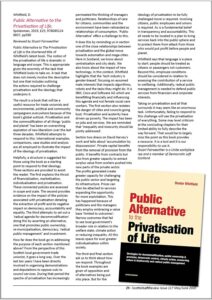Public Alternative to the Privatisation of Life by Dexter Whitfield sets out a radical agenda for decommodification, public ownership and provision, re-municipalisation, reconstructing democracy, radical public management, public investment and strategic action. It explains the drivers of financialisation, marketisation, individualisation and privatisation and sets out a political economy framework of privatisation. It details the corporate extraction of profits, impact on the quality of services, the erosion of democratic accountability and transparency, increased inequalities and the reduced capability of public authorities. Much of the evidence is from the UK and Europe, US, Canada, Australia, New Zealand, together with Asia, Africa and Latin America which have experienced significant levels and forms of privatisation, and where financial capital and transnational companies ruthlessly acquire privatised assets.
Spokesman Books, 580 pages – paperback, eBook and PDF formats.
Amazon Kindle and paperback and from good bookshops.
Further information in Public Ownership and Provision section.


25 November 2019
New Book: Dexter Whitfield, one of the foremost international experts on privatization, has published a new book, Public Alternative to the Privatisation of Life. The book “provides comprehensive evidence of the failure of privatization and the economic, social and environmental damage to people’s lives, working conditions and undermining of equalities. It details radical strategies for decommodification for a new era of public ownership and provision with participative and democratic accountability, quality public services, the preservation of nature and sustainable climate action.” Available in hard copy, PDF, and eBook formats. 580 pages. Also, if you’ve never read them, do check out Whitfield’s many other top flight books on privatization. It’s like going to privatization university.

Review in Chartist magazine, March 2020
Review in Scottish Left Review, Issue 117 May/June 2020 by Stuart Fairweather “The notion of the privatisation of life is dramatic in language and scope. This is appropriate given the enormity of the task that Whitfield looks to take on. A task that does not merely involve the descriptive but one that includes outlining the actions required to challenge privatisation and the ideology that underpins it.” ………………“Privatisation and the commodification of all things ‘public and planet’ has been an overarching aspiration of neo-liberalism over the last three decades. Whitfield attempts to respond to this. International examples,comparisons, case studies and analysis are all employed to illustrate the impact of the ideology of privatisation.”
Compelling vision of public services for the many not the few
MARJORIE MAYO recommends a robust alternative to aggressive privatisation
STRATEGIES for decommodification, public ownership and provision, democratic control, climate action, conserving nature and biodiversity and radical public management are among the crucial issues tackled in this book by Dexter Whitfield. A comprehensive guide from a highly experienced author and activist, it offers an incisive critique and an alternative vision for public services for the majority in Britain and internationally. The urgent need to tackle increasing privatisation and commercialisation, right-wing strategies that have been impacting on nature and biodiversity as well as on public services globally, is the focus of the book’s first section. It explains the ways in which financialisation, commercialisation and individualisation fit into these processes of privatisation, undermining the basis of public-service provision, and it provides a plethora of evidence to demonstrate the effects, which promote new ways of enabling the private sector to profit. Whitfield goes on to provide detailed evidence about the detrimental effects on service-users and communities, including on the environment. The consequences of privatisation on the quality of services in Britain are only too familiar, along with the ways in which it undermines the pay and conditions of public service providers. But there has been less familiarity with the impact on environmental concerns internationally as well as more locally and, in the meantime, democratic accountability is being undermined, making these processes more and more difficult to challenge. The final section of the book sets out a radical agenda for change and includes discussion of remunicipalisation and public investment, along with wider strategies for democratising public services, ensuring transparency and public accountability. These final chapters are not just comprehensive in terms of the range of issues that need to be addressed. Most importantly, they also take account of the links between these different aspects of the agenda for change. There are such important implications here. Progressive policy manifestos have identified services that need to be taken into public ownership before. So far, so good. But each service needs to be planned within the context of wider strategies for the public sector as a whole, at local, regional and national levels and beyond. We need to develop comprehensive plans for the range of services that we require and the links between them, taking account of nature and the climate as well as the quality of the jobs that are to be provided. There are important implications here for the trade union and labour movement and service users more generally. This is a very comprehensive book and there’s a wealth of detailed evidence to support the author’s arguments, drawing on experiences from across the globe, and it is clearly written and presented. It’s an extremely useful resource for the left. Morning Star, 30 July 2020


